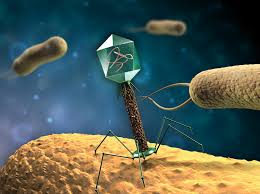
BACTERIOPHAGES (PHAGES) TO COMPLEMENT EFFORTS TO TACKLE ANTIMICROBIAL RESISTANCE
March 23, 2022
KEMRI LAUNCHES A CLOUD-BASED VACCINATION TRACKING SYSTEM
April 1, 2022KEMRI partners with WHO to manage COVID-19 in Africa

The First Sars-Cov-2 sequencing, and bioinformatics course begun at the KEMRI’s Centre for Geographic Medicine Research Coast (CGMRC) in Kilifi that seeks to increase capacity for genome sequencing and Bioinformatics not only regionally but throughout the African continent.
In his speech the Acting Director KEMRI, Prof. Sam Kariuki, which was read by Prof. Elijah Songok, Director of Research Capacity Building at KEMRI said ~Genomic surveillance is not a new activity in KEMRI since over the years, the Institute has continued to invest heavily in infrastructure to be able to effectively manage this important platform for various research purposes in most of KEMRI’s centers across the country. However, with the advent of the COVID-19 pandemic, the need for genome sequencing gave these platforms, particularly in KEMRI, an unprecedented attention because we were doing Genomic surveillance in tracking and monitoring existing and novel COVID-19 variants of concern in Kenya on behalf of the Ministry of Health. Thanks to the dedicated teams of researchers and scientists in KEMRI. Genomic surveillance platform remains a key research and surveillance infrastructure in KEMRI in the control and management of other infectious disease including the COVID-19 virus. It is also worth mentioning that KEMRI is part of the global scientific community that has successfully undertaken a whole genome sequencing that detected not just the circulating variants of SARS-CoV-2, but also informed some of the protocols and guidelines for the COVID-19 pandemic response by the WHO and the Ministry of Health. It is in this light that KEMRI transmission. “He added.
The training initiative was co-organized by KEMRI, World Health Organization (WHO), Africa CDC the objective of increasing the pool of genome sequencing and bioinformatics expertise among laboratory staff, scientists, and programme heads in order to upscale scientific research in this very important area in the region. It also aims at training scientists on how to track the different types of Covid-19 variants and how to treat them.
Speaking during the opening while welcoming the delegates for the training, Dr Joseph Mwangangi, Deputy Director CGMRC stated that they have been working on different pathogens and characterizing them based on the knowledge “We are able to know which variant is available, which one is taking response in terms of transmission etc. This information has been very helpful because we think as a lab, we are able to advise the government in terms of the circulating variants and variants of concern which is very important.” He said.

Prof. Elijah Songok, who represented the KEMRI Director in the opening, also noted that KEMRI has been on the forefront in the fight against Covid-19 not only in Kenya but the African region. “One of the expertise that we have which we are not only supporting the Ministry of Health and other African countries, is the issue of tracking the covid variants to see the types of covid circulating in the country and in the world. It is very important to track these variants because of the changing nature of Covid-19 every time.”
Also present in the opening was Dr. Samoel Khamadi, Acting Deputy Director, Centre for Virus Research (CVR), and Dr. Damaris Matoke, Acting Deputy Director of Biotechnology Program, who is also the coordinator for the training overseeing execution of the training in Kilifi, Nairobi and Kisumu. Dr. Matoke stated that “We are currently starting with Tanzania and Ethiopia and soon we are going to Eritrea, Rwanda and Burundi. This profiles Kenya highly because it clearly shows that Kenya is able to build capacity for other countries not only local people in Kenya, Africa and beyond Africa if need be.”
Mr. Dan Mogaka, who represented the Country Representative, WHO, said “we are training other countries in Africa so as to increase the capacity in the region on genomic surveillance which is critical for the management of the COVID-19 Pandemic”. He went ahead to explain that genomic sequencing was important because diseases have no boundaries and that’s why WHO is building capacity for laboratory teams from different countries to have the knowledge of how the diseases spreads with a view to contain it. Speaking during the official opening of the launch, Mr. Mogaka stated that “These training will help the local people because once the samples are taken from different health facilities, we will be able to know how diseases spread and come up with preventive measures.” He said.
Prof. Isabella Oyier, Dr. George Githinji and Dr. John Waitumbi will also be other faculty members for this very important journey towards management of COVID-19 pandemic in the African continent and will be assisted by a strong team of over 16 members of staff from KEMRI’s respective laboratories.

